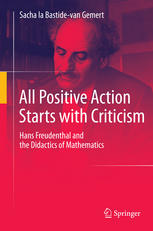

Most ebook files are in PDF format, so you can easily read them using various software such as Foxit Reader or directly on the Google Chrome browser.
Some ebook files are released by publishers in other formats such as .awz, .mobi, .epub, .fb2, etc. You may need to install specific software to read these formats on mobile/PC, such as Calibre.
Please read the tutorial at this link: https://ebookbell.com/faq
We offer FREE conversion to the popular formats you request; however, this may take some time. Therefore, right after payment, please email us, and we will try to provide the service as quickly as possible.
For some exceptional file formats or broken links (if any), please refrain from opening any disputes. Instead, email us first, and we will try to assist within a maximum of 6 hours.
EbookBell Team

4.8
104 reviewsThis study provides a historical analysis of Freudenthal’s didactic ideas and his didactic career. It is partly biographical, but also contributes to the historiography of mathematics education and addresses closely related questions such as: what is mathematics and where does it start? Which role does mathematics play in society and what influence does it have on the prevailing views concerning its accompanying didactics?.
Hans Freudenthal (1905–1990), professor in mathematics, scientist, literator, but above all mathematics-educator, was inextricably linked to the changes which took place in mathematics education and didactics during the second half of the last century. His diversity as a scientist and his inexhaustible efforts to establish the didactics of mathematics as a seriously pursued science, made Freudenthal's influence in this area considerable. He foresaw an essential, practical role for mathematics in everyone’s life, encouraging students to discover and create mathematics themselves, instead of imposing a ready-made mathematical system. The theory of mathematics education thus developed in the Netherlands would gain world fame in the following decades.
Today, in the light of the discussions about mathematics education, in which the call for `genuine’ mathematics instead of the so-called 'kindergarten'-mathematics can be heard, Freudenthal's approach seems to be passé. However, the outcome of this study (which is mainly based on documents from Freudenthal’s vast personal archive) shows a more refined picture. The direct identification of 'kindergarten'-mathematics with Freudenthal’s view on mathematics education is not justified. 'Realistic mathematics' as advocated by Freudenthal includes more than just a practical introductory and should, among other things, always aim at teaching 'genuine' mathematics in the end.